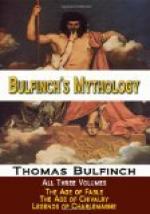Calais, French town facing England,
Calchas, wisest soothsayer among the Greeks at Troy,
Caliburn, a sword of Arthur,
Calliope, one of the nine Muses
Callisto, an Arcadian nymph, mother of Arcas (see Bootes), changed by Jupiter to constellation Ursa Minor,
Calpe, a mountain in the south of Spain, on the strait
between the
Atlantic and Mediterranean, now Rock of Gibraltar,
Calydon, home of Meleager,
Calypso, queen of Island of Ogyia, where Ulysses was wrecked and held seven years,
Camber, son of Brutus, governor of West Albion (Wales),
Camelot, legendary place in England where Arthur’s court and palace were located,
Camenae, prophetic nymphs, belonging to the religion
of ancient
Italy,
Camilla, Volscian maiden, huntress and Amazonian warrior, favorite of Diana,
Camlan, battle of, where Arthur was mortally wounded,
Canterbury, English city,
Capaneus, husband of Evadne, slain by Jupiter for disobedience,
Capet, Hugh, King of France (987-996 ad),
Caradoc Briefbras, Sir, great nephew of King Arthur,
Carahue, King of Mauretania,
Carthage, African city, home of Dido
Cassandra, daughter of Priam and Hecuba, and twin sister of Helenus, a prophetess, who foretold the coming of the Greeks but was not believed,
Cassibellaunus, British chieftain, fought but not
conquered by
Caesar,
Cassiopeia, mother of Andromeda,
Castalia, fountain of Parnassus, giving inspiration to Oracular priestess named Pythia,
Castalian Cave, oracle of Apollo,
Castes (India),
Castor and Pollux—the Dioscuri, sons of
Jupiter and Leda,—
Castor a horseman, Pollux a boxer (see Gemini),
Caucasus, Mount
Cavall, Arthur’s favorite dog,
Cayster, ancient river,
Cebriones, Hector’s charioteer,
Cecrops, first king of Athens,
Celestials, gods of classic mythology,
Celeus, shepherd who sheltered Ceres, seeking Proserpine, and whose infant son Triptolemus was in gratitude made great by Ceres,
Cellini, Benvenuto, famous Italian sculptor and artificer in metals,
Celtic nations, ancient Gauls and Britons, modern
Bretons, Welsh,
Irish and Gaelic Scotch,
Centaurs, originally an ancient race, inhabiting Mount Pelion in Thessaly, in later accounts represented as half horses and half men, and said to have been the offspring of Ixion and a cloud,
Cephalus, husband of beautiful but jealous Procris,
Cephe us, King of Ethiopians, father of Andromeda,
Cephisus, a Grecian stream,
Cerberus, three-headed dog that guarded the entrance to Hades, called a son of Typhaon and Echidna
Ceres (See Demeter)




